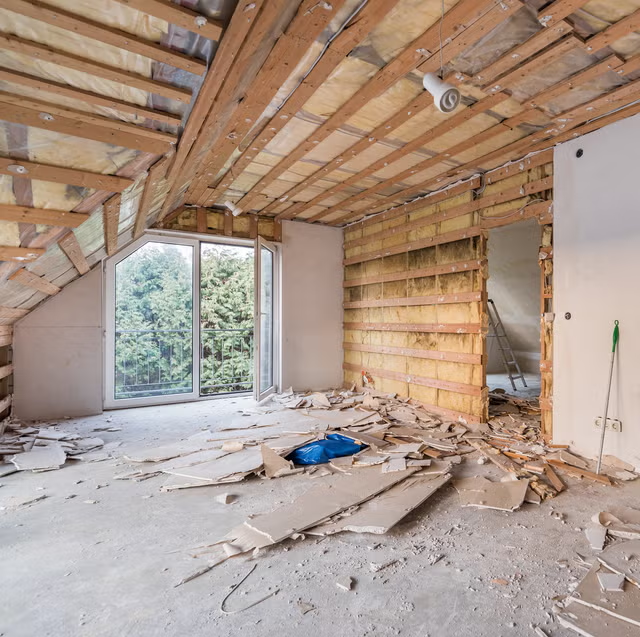Should You Renovate Right After Moving In? Pros, Cons & Timing Tips for UK Buyers
Just moved into your new home? Discover the pros and cons of renovating straight away, essential timing tips, and smart renovation advice for first-time buyers in the UK.


You’ve Got the Keys — But Is It Time to Grab the Sledgehammer?
Moving into a new home is a major milestone—especially for first-time buyers . Once the removal van is gone and the boxes are unpacked many new homeowners wonder:
“Should I start renovating now or wait?”
While the idea of transforming your space to reflect your taste is exciting jumping into renovations immediately after buying a house isn’t always the best move.
This guide will help you weigh up the pros and cons understand the best time to renovate a new home and give practical tips tailored to UK buyers.
 Pros of Renovating Right After Moving In
Pros of Renovating Right After Moving In
1. You Can Start with a Clean Slate
No furniture no clutter no sentimental attachment. It’s easier to tear out flooring knock down walls or paint rooms before you've settled in.
2. You’ll Only Be Disrupted Once
Instead of unpacking and then re-packing for renovations later doing the work up front saves future upheaval.
3. Energy Efficiency & Safety Can Be Improved
If the property needs rewiring boiler upgrades or insulation it’s often better to tackle these jobs before you're fully living in the space.
4. Some Works Might Be Urgent
If your survey flagged issues (damp leaks poor electrics) addressing them straight away may be necessary to avoid long-term damage or further cost.
 Cons of Renovating Immediately After Purchase
Cons of Renovating Immediately After Purchase
1. You May Not Know the Property Yet
Living in the space for a few months gives you a feel for:
Light flow
Storage needs
Layout frustrations
What you thought needed “fixing” might turn out to be charming—or manageable.
2. It Can Be Financially Risky
After paying stamp duty solicitor fees and moving costs your budget may be stretched. Rushing into big renovations without a clear budget can lead to overspending.
3. Planning Permission or Quotes Take Time
Even cosmetic updates like kitchen extensions or bathroom upgrades often require multiple quotes design revisions or planning approval.
4. You May Not Prioritise Correctly
Without a lived-in experience you might spend on things that don't add comfort or value—like trendy upgrades over structural needs.
 When’s the Best Time to Renovate a New Home?
When’s the Best Time to Renovate a New Home?
There’s no one-size-fits-all timeline but here’s a general guide based on common first-time buyer scenarios in the UK:
Renovation Type | Ideal Timing |
|---|---|
Urgent repairs (damp electrics) | Immediately after completion |
Cosmetic changes (paint floors) | First few weeks before unpacking |
Layout changes (walls open-plan) | 1–6 months in — after observing how you live |
Kitchen/bathroom refits | 6–12 months to allow budget and planning |
Loft conversion/extension | After 1 year — requires permissions long planning |
 First-Time Buyer Renovation Tips
First-Time Buyer Renovation Tips
Whether you're painting a single room or planning a full remodel here are smart strategies to stay in control:
 1. Set a Realistic Budget (and Add 20%)
1. Set a Realistic Budget (and Add 20%)
Renovation costs often spiral. Always factor in contingency.
 2. Get Multiple Quotes
2. Get Multiple Quotes
Don’t accept the first builder or tradesperson you meet. Compare reviews portfolios and availability.
 3. Check What Adds Value
3. Check What Adds Value
Not all renovations are equal. Kitchens bathrooms and energy upgrades typically deliver better ROI than trendy add-ons.
 4. Explore Financing Options
4. Explore Financing Options
If savings are low check if you can remortgage for improvements or apply for renovation loans. But do your sums carefully.
 5. Live In It First — If You Can
5. Live In It First — If You Can
You’ll often make better design decisions once you experience the space. Unless urgent delay major works by 3–6 months.
 Should You Move In Before or After Renovation?
Should You Move In Before or After Renovation?
If major works are planned such as:
Rewiring
New central heating
Floor replacement
It’s better to delay moving in if possible.
If it’s just minor decoration or a new bathroom you can usually live around the work—just expect some dust and disruption.
 Real-Life Example: A First-Time Buyer in Birmingham
Real-Life Example: A First-Time Buyer in Birmingham
Ella and Jordan bought their 1930s semi in the West Midlands and were keen to renovate the kitchen straight away. But after living in the house for six months they realised:
The dining room made more sense to convert
The bathroom was a more urgent priority
Their initial kitchen plans would have cost £12 000 more than their final revised idea
“Living in it first saved us thousands ” Ella said.
 Final Verdict: Renovate Smart, Not Fast
Final Verdict: Renovate Smart, Not Fast
Renovating straight after buying a house in the UK has benefits—but also major drawbacks. Unless the property is unliveable most first-time buyers will benefit from living in the space for a few months before making big decisions.
Use that time to observe plan and prioritise — and enjoy the feeling of homeownership without the chaos of an immediate building site.



![Flood Zones, Noise, and Crime: What Area Reports Can Reveal to UK Homebuyers [2025 Guide]](https://a.storyblok.com/f/335762/1666x850/c67f7cec43/map-from-check-flooding.png)
![What Is Indemnity Insurance and When Might You Need It? [2025 UK Buyer’s Guide]](https://a.storyblok.com/f/335762/2560x1707/d026575128/what-is-indemnity-insurance-scaled.jpg)
![What Surveyors Don’t Check: Common Misunderstandings Every UK Homebuyer Should Know [2025 Guide]](https://a.storyblok.com/f/335762/352x240/c7bfdabdfb/survey-female-352x240-jpg.webp)